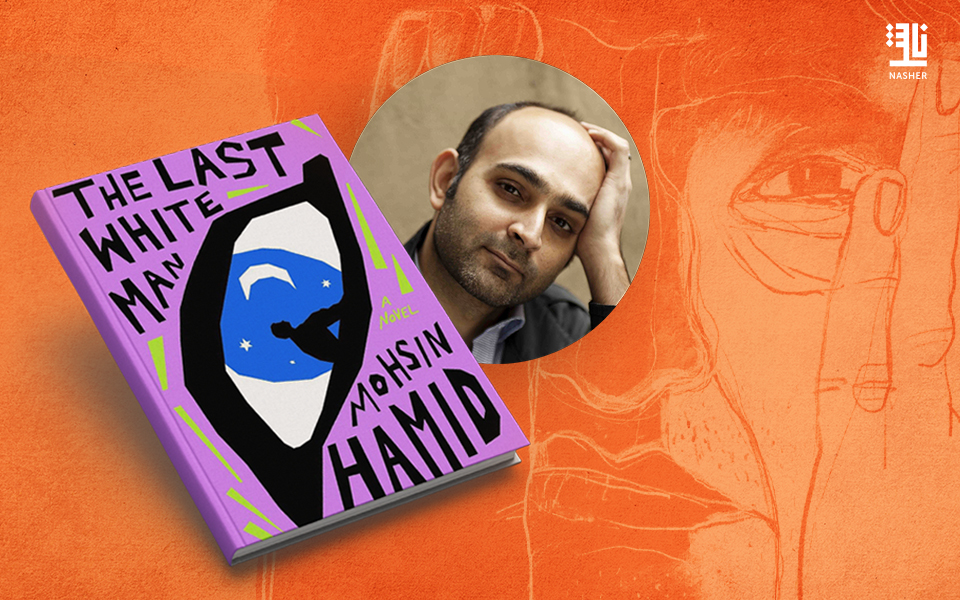In The Last White Man, Mohsin Hamid’s fifth novel, the protagonist, Anders, wakes up to discover that he has changed race. He looks in the mirror to see not the familiar white face, but “the dark man who had been Anders”. Hamid doesn’t seek to explain why this dramatic transformation takes place, but rather to explore the impact that it has on the people of the unnamed American town in which Anders lives. For although he is one of the first to undergo the transformation, the novel is true to its title and eventually there is just one white man left, and then there are none.
The conceit in The Last White Man works in a similar fashion, forcing us to examine the way that race conditions our reaction to others, and our conception of ourselves.
Anders is a likable everyman who works in “a black iron gym, a rough gym, where men, and it was usually only men, tested themselves with barbells against gravity”. He is in an on-off relationship with his childhood sweetheart, Oona, a yoga teacher who lives what she feels is an “interrupted, or abandoned, life” following a family tragedy. Anders’s change in skin colour overthrows the listless predictability of the couple’s existence. The first response is violence. From Anders: “He wanted to kill the coloured man who confronted him here in his home.” From his boss at the gym, who tells Anders that he would have killed himself if it had happened to him. From Oona’s mother, who is horrified to find that her daughter is in a relationship with a dark-skinned man and seeks solace in increasingly strident and paranoid right-wing forums online. As more and more people are transformed, online unrest spills out on to the streets. Militants take control of the town, protesting against the fact that it has become “a different place, a different country, with all these dark people around, more dark people than white people”. Anders finds himself no longer welcome at the gym, where previously the only other member of staff who wasn’t white was a janitor. He recognises that “the way people act around you, it changes what you are, who you are”, but that this change is not necessarily wholly negative. He becomes closer to his sickly, working-class father, eventually moving in with him. His relationship with Oona flourishes despite the violence on the streets. At the same time a sense of imminent threat hangs over everything and “Anders no longer strayed far from his rifle”.
At its heart, this is a novel about seeing, being seen, loss and letting go. The loss of privilege that comes from being perceived as white, and no longer being able to view the world from within whiteness, are some of the anxieties examined here.
Each character deals with the loss of their whiteness differently. Oona’s mother, for instance, retains hope that her grandchildren will be born white, though concedes that it’s probably unlikely. Anders, a gym instructor, tries to cope with being seen differently by colleagues and regular patrons. It’s Oona, however, whose quiet self-inquiry offers the most affecting response.
Oona is also grieving for her brother, who has died from an overdose. The process by which she navigates mourning a sibling and, at the same time, the loss of her former self, becomes revealing. Common rituals are presented as ways to acknowledge the past – revisiting old photographs, returning to familiar hangouts, telling stories of people she’s lost – all the while accepting the necessity for change.
Oona’s mother believes the whole thing is part of “a plot that had been building for years, for decades, maybe for centuries, the plot against their kind.” And others seem to agree because they form a kind of militia that attacks, threatens or even kills people like Anders who have turned brown. The mood becomes ugly, riots and violence are everywhere, Oona and Anders become afraid to go out.
Then, of course, Oona herself changes, and Oona’s mother, and all the angry people trying to defend whiteness. One by one, everyone changes, and in the end, there are no white people left at all.
Hamid is not just concerned with whiteness, though; as his title intimates, he’s also bearing down on manhood. Anders’s father is dying of cancer; the abrupt racial divide prises between them like a knife, but ultimately their relationship prevails: “Anders…came first, before any allegiance, he was what truly mattered, and Anders’s father was ready to do right by his son, it was a duty that meant more to him than life, and he wished he had more life in hum, but he would do what he could with what little life he had.” Oona, still mourning the premature death of her addict twin brother, confronts a similar challenge in her widowed mother, an elderly racist who’s convinced there’s a Great Replacement conspiracy afoot, and cheers on the militaristic maneuvers of militias. Riots explode, forcing lockdowns. Tensions roil across generations, cities, nations.
Hamid has spoken of his relationship to whiteness as something he accessed with confidence, if not comfort, prior to 9/11. Born in Lahore, Pakistan, he lived in California as a child when his father was enrolled in a doctoral program at Stanford. The younger Hamid came back to the United States for college, graduating summa cum laude from Princeton, where he studied fiction writing under Toni Morrison and Joyce Carol Oates, and then pursued a law degree at Harvard and took a high-paying job as a management consultant. After the terrorist attacks, though, his Muslim heritage complicated his presence among the corridors of American elites
The Last White Man by Mohsin Hamid is published by Hamish Hamilton. We have given it a rating of 6/10.







